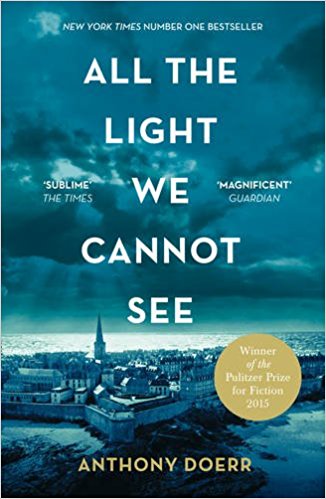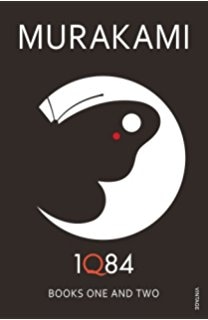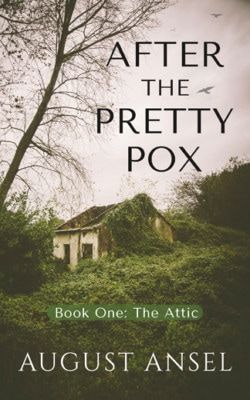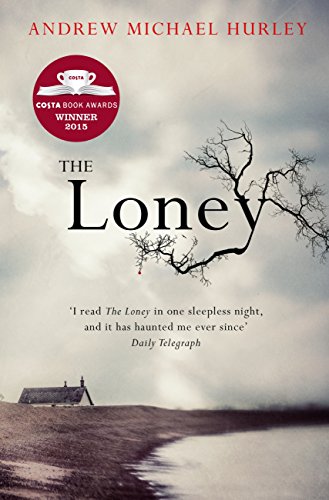|
All the Light We Cannot See is a World War II drama about a blind French girl called Marie-Laure and a German boy called Werner who grow up in very different circumstances and whose lives eventually converge.
This book won the Pulizer Prize in 2015, so it goes without saying that it’s good. It actually took me a while to read it, a) because it’s long; and b) because I got kind of war-jaded about a third of the way in and took a break to read something else. When I came back to it though, I got through the last half pretty quickly. Trying to escape the coming war, Marie-Laure’s father takes her to live with her reclusive uncle in the fortified French seaside town of Saint Malo. Shortly after, Daniel disappears, leaving Marie-Laure to survive with the help of her uncle and a housekeeper. Meanwhile, in Germany, Werner is an orphan with genius-like aptitude for radios who is drafted into the Hitler Youth, and eventually ends up in Saint Malo, as part of a team hunting down rogue resistance radio operators. It’s beautifully written, with poetic prose on every page. The chapters are extremely short, rarely more than two or three pages, so it’s easy to get through. The description is fantastic, and you really get a feel for life under siege and the hopelessness of the characters’ situations. As with most war-themed books, there are lots of things that never get full closure. Sometimes people who disappear are never found, and there are injustices that aren’t righted. It kind of reminded me a little of Atonement by Ian McKwan, where you know that while some characters might come out of it okay, there will be some that don’t, leaving you with a sense of regret that not all endings are happy, yet satisfaction at the book’s realism. Looking it as a writer (as I always do in these reviews), there’s a lot to learn in the form of structure, and especially the use of very short chapters. My own tend to run 1500-2000 words, but at a guess most in this book were in the sub-1000-word range (3-4 pages). Also in the way certain things were never explained or left off screen. This is an important technique that inexperienced writers often fail to use correctly – the notion that you don’t have to say everything. Once you’ve built up an image for the reader, it’s okay to leave some resolutions to the reader’s imagination. A story is as much what you don’t say as what you do. Two examples of endings left to the reader’s imagination that come to mind are the fate of one of the slaves (it’s either Halle or one of the Pauls, I forget which without rereading it) in Toni Morrison’s Beloved, and the demise of Syrio Forell in George RR Martin’s A Game of Thrones. If I had to pick a hole it would be that the omniscient narrator negates the fact that Marie-Laure is blind, because even though she can’t see what’s going on, we still do. It’s a small gripe though, and doesn’t stop you from enjoying the story. Anyway, All The Light We Cannot See gets a five from me.
0 Comments
I finally got to this end of this book after starting it about a year ago, then putting it aside for a few months while I read a couple of others, then picking it up again. Reading Murakami is something of a rite of passage for foreigners living in Japan, so not surprisingly I’ve read a bunch. His books would be considered “magical realism”, where they’re based in the real world but have this kind of slipstream fantasy going on. Difficult to explain, and in fact, a lot of the weird stuff that goes on in his books is left unexplained. This is one reason, of course, while I have a very love-hate relationship with his books, and consider his best book to be Norwegian Wood, a book that make him a superstar and was intentionally written as a “regular” drama.
1Q84 is very much magical realism. The main characters start to see two moon in the sky, and there are frequent references to the Little People, strange beings who can come through “receivers” into the world of 1Q84, which is subtly different from 1984, when the book is set, don’t you know. Murakami’s books are always very readable and really personable, giving you this sense that living in Tokyo as a young person is this wonderfully bohemian lifestyle (and as someone who lives only two hours from Tokyo by train, it’s even more poignant). However, unlike most of his books that I’ve read, this one really sprawls. Slow build up doesn’t really describe it. The book features two characters, Tengo and Aomame. Tengo is a part time math teacher in a private school, and an aspiring novelist. Aomame is an assassin who knocks of men who’ve abused their wives on behalf of a rich old woman known as “the dowager”. The characters are portrayed in alternative chapters, and you get the impression than they know each other in some way (we find out on like page 500). Anyway, Tengo is asked by an editor friend to rewrite a short story called Air Chrysalis, written by a seventeen-year-old girl called Eriko Fukada (Fuka-Eri), who comes from a kind of cult group. Meanwhile, Aomame is asked to knock off a man we find out later is Fuka-Eri’s father, because he is apparently a child abuser. So we’re led to believe, and at the end of this 624-page book we’re still not quite sure. And that’s pretty much the sum of it. The world of the characters is explored in great detail, but things happen really slowly. There are conversations that appear to be little more than musings on life that go on for pages and pages, and the whole way it’s written is that the characters aren’t sure what’s going on. And neither, of course, are we. Such is the risk you take when you read Murakami. From a writing point of view, obviously this is a translation, and while the narration is third-person limited, it spends a lot of time with the thoughts and feelings of each characters, as well as all the vagueries of language (the almosts, justs, maybes and probablies), in short, all the things that know-it-all indie writers tell the rest of us we shouldn’t do. It makes the narrative very welcoming and easy to read (when I picked it up again, I read the second half in a couple of weeks – a positive racing car pace for me), but at times it would be nice if it got to the point a little quicker. And then of course, you get to the end, and find out that that its not the end, that there is a second, 466-page book that I have to read next. I’ve invested so much in this story that I’ve already downloaded the sample, but honestly, if you wanted an intro to Murakami, take on one a little shorter. Norwegian Wood is a masterpiece that made him a household name in Japan, a book everyone should read. And if you want to go with the magical realism go with something a little shorter, like Sputnik Sweetheart or Kafka on the shore. Just don’t expect to get all the answers – you won’t. My Rating: 5 out of 5 stars
I randomly came across this book while I was browsing Amazon and something about the cover and the title intrigued me. I downloaded the sample, and it was incredible, so I went with the full book. I was very glad I did. I guess this is what is called survivalist fiction. From a plot point of view, this is absolutely nothing new: a pseudo-The Stand type virus has wiped out most of the human race, and the few remaining humans are trying to survive as best they can. What sets The Attic apart is just how well it’s written, and how such a simple story could leave such a deep impression on me. The main character, Arie, is a fifty-something woman, hiding out in her grandmother’s attic, completely cut off from society, but surviving rather well with her rooftop water tanks and food boxes, plus a selection of goods she’s scavenged. Over the course of a couple of days, a few new people enter her life: her long lost younger brother, Handy, an injured girl, Renna, and a young man, Curran, and his dog, Talus. All of them have a story to tell, but here is where the book sets itself apart from most indie books I try to read. The vast majority, within a page or so, will then drop a fat info dump something like this: “The plague started six years ago. Waffle waffle, pointless background bullshit, more bullshit no one cares about because we haven’t even got to know the characters yet, ten more paragraphs of boring, uninteresting drivel…” oh, I quit and went on to read something else. The Attic feeds in only what you need to know and so sparingly that you’re desperate to know what’s going on. August Ansel, or whoever she is behind the pseudonym, is an expert storyteller. This book focuses on the details of the characters rather than the background world, and as a result, you feel their pain, their fears, their hopes. You worry when they don’t come back from the woods. The Attic is the kind of book that I would carry around with me, take into the toilet, pull out while stuck at traffic lights (on a Kindle, obviously). Very good, very recommended. My rating : 4 out of 5 stars
The Loney is a gothic horror novel set on the Lancashire coast, northwest England. At the very beginning, the body of a baby is discovered in an old house that has been washed into the sea. Seeing the reports, the unnamed narrator (okay, his family name is Smith and a priest calls him Tonto) recalls a time in the 1970s when his family used to visit there to pray for a miracle for his mute brother, Hanny (Andrew). Overall this book is very well written and extremely atmospheric. I would say that is its best feature. It really makes you feel the cold and the mist, the creepiness and the unfriendliness of the locals. While there are a couple of horrific scenes, its difficult to classify it as a traditional horror because its not particularly jumpy, it's more the overreaching sense of dread that permeates everything. What I liked about it most was that the author uses clever devices to set it apart from other books in its genre. For example, instead of mum and dad we have "Mummer" and "Farther", while the book is never referred to by his actual given name, giving him a certain disconnection from the reader and the sense that something unusual might happen. What I didn't like so much was that things are never really explained that well. I think that was the author's intention, and obviously as an author myself I understand these things, but certain aspects of the plot were left unresolved. The biggest being of course what really was going on in Thessally, the big old house that has collapsed at the very start of the novel, to reveal some of its secrets. Another thing that is very clear by the end is that Smith is an unreliable narrator, meaning that he might not be telling us everything he knows. If you like dark and atmospheric books rather that out and out horrors, you might want to give this one a go, but be warned that there's an absolutely ton of religious symbolism in it and certain things you're hoping to find out at the end will be left to your imagination. |
My reviews
See what I think about the books I've read. Archives
May 2017
Categories |




 RSS Feed
RSS Feed